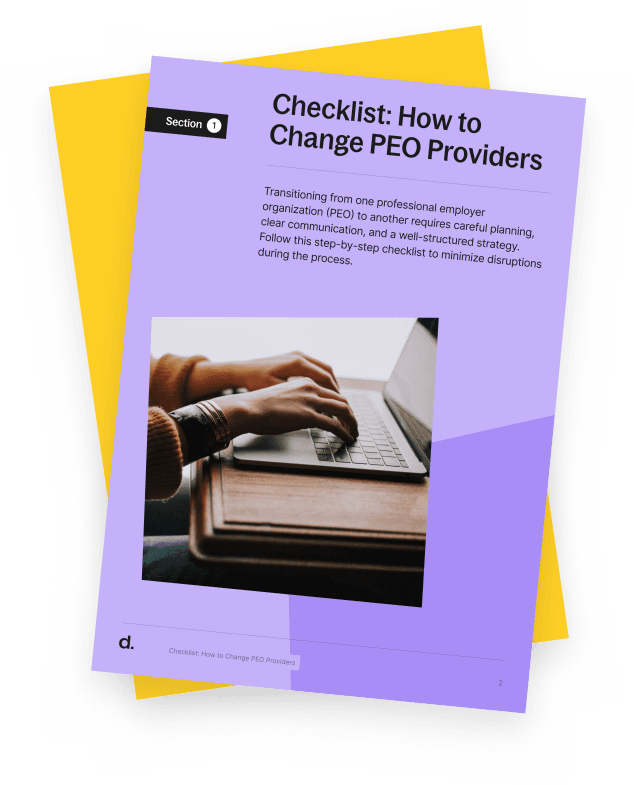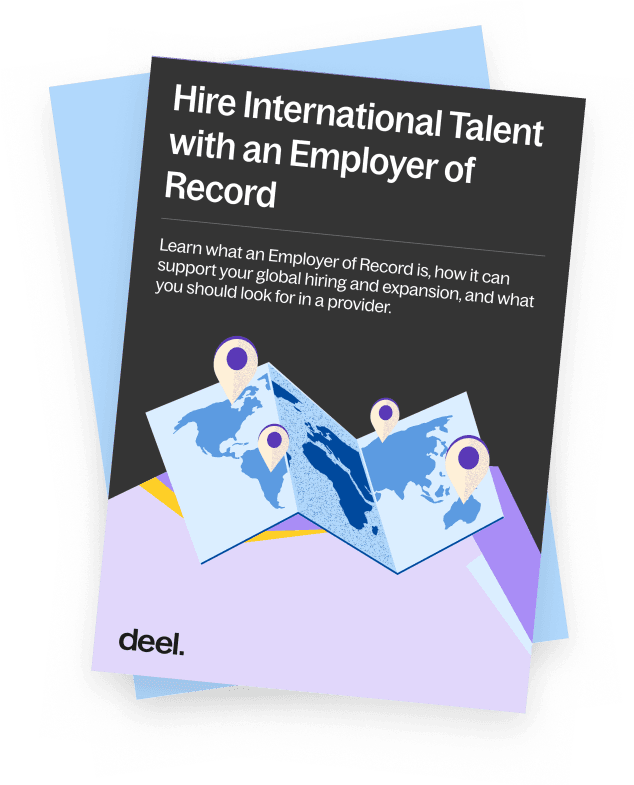Article
17 min read
8 Best PEOs for Small Businesses in 2026: Pros, Cons, and Costs
PEO

Author
Dr Kristine Lennie
Last Update
January 13, 2026

Table of Contents
Pros and cons of using a PEO for a small business
Best PEOs for small businesses (2026 roundup)
Key questions checklist for prospective PEO providers
Unlock seamless HR, payroll, and compliance solutions with Deel PEO
Key takeaways
- A professional employer organization (PEO) is an HR outsourcing model in which the provider and client enter a co-employment contract. The PEO takes on the administrative duties and risk, while the client focuses on running the business.
- PEOs are especially beneficial for small businesses, but choosing a provider can be challenging, as employers must consider the scope of service, digital tools, customer support, and potential hidden costs.
- Deel PEO brings you a fully in-house infrastructure and licensed experts that seamlessly handle tax filing, payroll, and compliance across all 50 US states, while streamlining your HR and admin operations.
Businesses often face challenges in managing HR, payroll, and compliance alongside multiple competing priorities and limited resources. This is especially true for small companies, which are typically focused on product and sales, struggle to compete for talent against larger employers, and cannot sustain a dedicated people operations team.
One possible solution is to partner with a professional employer organization (PEO)—a co-employment model for outsourcing time-consuming admin and back-office functions, mitigating liabilities, and accessing more competitive employee benefits. A 2024 white paper by the National Association of Professional Employer Organizations (NAPEO) found that PEO services boost growth and employee retention, halving the risk of closure.
But with multiple providers on the market, each with its own distinct service offering and pricing, how can employers identify the best solution for their specific needs? This article compares some of the most popular options for small businesses in 2026, including strengths and weaknesses, pricing, and what might make a specific PEO a good choice for you.

Pros and cons of using a PEO for a small business
As a small business owner, you might be weighing your options on whether or not to co-partner with a PEO. While PEOs can involve upfront costs and commitments, they also offer long-term savings, access to better benefits, and a minimized back-office workload—among other advantages.
Consider the following factors in your decision-making:
Pros
Entering into a co-employment arrangement with a PEO typically includes the following advantages:
- Outsourced HR and administrative burdens, including benefits enrollment, management, and employee support
- Streamlined tax and payroll processing across various jurisdictions
- Reduced compliance risks and legal exposure
- Simplified hiring, onboarding, and offboarding processes
- Access to enterprise-level benefits at large-group rates
Cons
There are several potential limitations that clients should consider when exploring PEO as an option:
- Reduced direct control over certain HR functions, as these are typically shifted under the PEO’s standardized processes
- Potential misalignment of values or practices if the selected PEO is not a strong fit for your company’s culture or needs
- Variation in service scope across providers and, in some cases, hidden costs for certain solutions
- Long-term co-employment contracts that might include penalties for early termination, meaning employers need to be careful when choosing their carrier
When should you consider partnering with a PEO?
There are several scenarios where a PEO might be a suitable option:
- Your in-house team is spending too much time managing day-to-day HR, payroll, and benefits admin
- You are hiring across multiple states and require help navigating the different labor laws and regulations
- You are an international company, looking to enter the US market
- You are interested in boosting your competitive edge in the talent market by enhancing your benefits package
- You are looking to minimize risk and legal liability so you can focus on core operations
- You are preparing to scale quickly or adopt a remote working model
Unsure if a PEO is the right choice for you? Read our ASO vs. PEO piece, including a checklist that compares these two HR outsourcing models.

Best PEOs for small businesses (2026 roundup)
Different PEO providers have different strengths and offerings. When choosing the right one for your business, you need to carefully consider your priorities, strategic goals, and budget. Here are eight leading options to explore in 2026:
1. Deel PEO
Deel is a global people platform, offering hiring, payroll, HR, and compliance solutions to more than 37,000 businesses worldwide. Deel PEO runs on an entirely in-house infrastructure with licensed experts and comprehensive support for all 50 US states. Our platform is designed to integrate easily with your existing tools and offers streamlined workflows with built-in compliance.
Key features
- A unified platform, equipped with all the necessary tools to hire, pay, and manage remote, hybrid, and office-based teams across different states
- Tax and payroll management for different types of workers (full-time, contractors, exempt or non-exempt, etc.)
- Full compliance coverage at the federal, state, and local levels, including continuous monitoring of evolving regulations
- An AI-powered assistant that provides you with tailored HR and legal insights to support better decision-making
- Comprehensive PTO and expense tracking, all in one place
- Automated onboarding, offboarding, and training for employees across all locations
- Instant and customizable report generation, including payroll, growth, and retention analytics
- End-to-end document workflows for the full employment lifecycle—from contracts, new hire reporting, and termination paperwork, to severance and unemployment claims
- 60+ benefit plans offering Fortune 500-level coverage at a fraction of the cost
Pros and cons
Advantages:
- Fully in-house expert support, without reliance on third parties or external vendors
- Proprietary infrastructure ensuring complete oversight of all data, operations, and compliance
- Part of Deel's all-in-one platform, combining payroll, HR, IT, immigration, and workforce management across the US and internationally
- Empowers businesses of all sizes, from fast-growing start-ups to large organizations
- In-house solutions for seamless and compliant global hiring
- Exclusive access to Aetna International benefits plans
- 24/7 customer support, regardless of your location
- Transparent pricing, with no hidden fees
Don’t have a local entity? Deel EOR—our Employer of Record (EOR) service—lets you hire international talent without the time, cost, or complexity of setting up legal entities. It’s a fast, compliant way to grow your team across borders, with no infrastructure required.
Considerations:
- Deel’s feature-rich platform may require time for clients to get fully up to speed
- The pricing model is set per employee and can require careful budgeting for a large workforce
Pricing
- Starts at $95 per employee/month
Deel customer reviews
4.8 rating (G2) based on 8,800+ reviews
Best for
Companies of all sizes, whether US-based or international. Deel’s comprehensive services and all-in-one platform simplify every aspect of the HR, tax, and payroll processes. With our in-house legal experts and built-in compliance tools, you can hire and manage your workers globally or domestically, while we take care of the legal work.
2. Justworks
Justworks is an international company headquartered in New York, with offices in several other locations around the world. Its PEO product specializes in helping small and medium-sized businesses by providing HR, payroll, compliance, and admin services through a modern, unified platform. In 2025, its US client base reached as many as 12,000 small businesses.
Key features
- A platform for all HR, benefits, payroll, and compliance tasks
- Automated payroll and tax processes that sync with worked hours, overtime, and compensation data
- A single documentation and personnel information hub
- Financial and compliance support
- Streamlined hiring and onboarding processes for growing teams
- Large-company benefit options at affordable prices
- Insight reports that assist in strategy and decision-making
Pros and cons
Advantages:
- Tiered service packages that provide different scopes of service
- 24/7 customer support
- Optional EOR service for hiring internationally
- Low medical insurance rates in the first year of service
Unsure about the difference between a PEO and an EOR? Explore our comparison guide to learn when to use each.
Disadvantages:
- Contract payments through the platform are limited to about 30 countries
- Some limitations in the HR support (such as Family and Medical Leave Act (FMLA))
- The basic plan lacks some core expected features related to benefits, employment practices liability insurance (EPLI), and admin
- Payroll reporting customization is limited to a handful of filters
- Time-tracking is a paid add-on, billed separately from the core services
- Costs can rise significantly for larger teams, particularly as medical insurance rates tend to jump after the first year
- Their EOR is limited to only a small number of countries, with the remaining ones covered by a third party
Pricing
- The base plan includes a $50 monthly fee plus $8 per employee/month, PEO Basic at $79 per employee/month, and PEO Plus at $109 per employee/month
Justworks customer reviews
4.6 rating (G2) based on 1,100+ reviews
Best for
Ideal for startups that want flexible outsourcing options without upfront commitment. Also valuable for small to mid-sized businesses seeking intuitive HR, compliance, and admin support while focusing on growth.

3. ExtensisHR
Since 1997, ExtensisHR has provided PEO services for small and scaling businesses. Today, it is one of the fastest-growing PEOs in the US. With the rise of remote work and cross-border hiring, their offering has evolved to include solutions that cater to distributed teams.
Key features
- Two PEO bundles—standard and “premier”—providing clients with different levels of support
- Single-platform solution for HR, payroll, benefits, and risk management
- Tax filing, admin, and compliance services across different states
- Employee self-service portal that enables access to payment records, PTO balance, and benefits enrollment
- Employee benefits packages
- Integrated cloud-based learning and development for employees
- Talent acquisition and retention support
Pros and cons
Advantages:
- Well set up to support remote and hybrid teams
- A designated support team for each client, providing HR support and guidance
- An in-house EOR solution allowing businesses to expand globally
- Focus on employee satisfaction, through benefits options, and learning and development opportunities
Disadvantages:
- Less suitable for handling the more complex demands of larger organizations
- Non-transparent costs
- No clear, side-by-side comparison of the features available in the different pricing tiers
Pricing
- Quote-based pricing, generally regarded as affordable for small businesses
ExtensisHR customer reviews
4.6 rating (G2) based on 50 reviews
Best for
Startups and small, fast-growing businesses that are seeking to outsource their HR, compliance, and payroll functions, especially those managing distributed or hybrid teams.
4. TriNet
TriNet is a prominent PEO provider with eight offices across the US and approximately 20,000 clients as of December 2024. They provide services for small and mid-sized businesses nationwide.
Key features
- An HR service bundle that includes payroll processing, benefits management, talent acquisition, and onboarding
- Compliance support for handling federal, state, and local tax laws
- Access to a network of large-group benefits packages
- Time-tracking feature that feeds into the payroll systems
- Talent and workforce consulting for improving employment structures and engagement
- Self-service portal for managing employee benefits, PTO, and pay stubs
- EPLI coverage managed by an internal team
Pros and cons
Advantages:
- Extensive benefits and legal support
- Industry-specific compliance consulting services
- A platform that integrates easily with your existing HR tools
Disadvantages:
- Some clients have found the interface and onboarding process to feel less modern than other alternatives
- Generally pricier than other PEOs on the market, making it potentially prohibitive for some businesses
- No in-house solutions for international hiring
- Customer support can require initial engagement through bots or scripts before reaching a representative
- Some clients report delays in reaching account representatives due to the size of the company
Pricing
- Custom pricing available only through direct consultation
TriNet customer reviews
4.0 rating (G2) based on 700+ reviews
Best for
Small and mid-sized businesses, especially those interested in specialized industry guidance. Well-suited for organizations with complex or rapidly evolving needs.
Global Hiring Toolkit
5. Sequoia One
Sequoia One is a US-focused PEO that launched in 2001 in Silicon Valley as a one-employee, one-client business. Since then, it has expanded nationwide, providing services to venture-backed startups and fast-growing companies, particularly in the tech sector. Today, Sequoia One supports more than 2,200 corporate clients.
Key features
- Outsourced HR, payroll, and tax management services
- Platform combines HR functions, compliance tools, and an employee self-service portal
- Compensation planning, management, and road mapping features aimed at supporting strategy
- Access to enterprise-level benefits
- Risk mitigation and compliance services optimized for hybrid work environments
- Customizable reporting and analytics
Pros and cons
Advantages:
- Expertise in the startup space
- Tools that support a holistic approach to leadership, with an emphasis on transparency and data-informed engagement
- Five dedicated consultants per client, providing custom benefits, HR, and payroll support
- Support for clients who want to transition from the PEO model to in-house HR teams using the Sequoia People Platform
Disadvantages:
- Not well-suited for handling the more complex needs of larger organizations
- No in-house options for global hiring—relies on an external partner instead
- Pricing is not publicly listed on the website
- Some users report that the interface feels outdated compared to newer platforms
- Limited number of verified customer reviews available online
Pricing
- Custom quotes are available through a demo or a meeting with a consultant
Sequoia One customer reviews
4.0 rating (G2) based on 8 reviews
Best for
Rapidly growing, venture-backed startups, particularly those in the tech industry who are seeking a partner that understands their specific challenges and aggressive growth goals.
PEOs can be especially valuable for start-up companies that move at speed, juggle multiple projects, and require support managing their HR functions. Learn about the experience of one startup founder who used Deel PEO for their US expansion.
6. Insperity
Insperity is a large PEO provider, with over 100 offices nationwide and more than 100,000 clients. It offers two key bundles—its HRCore option, delivering HR services without a co-employment relationship, and HR360, its full-service PEO package (discussed below).
Key features
- HR and payroll services covering businesses’ admin needs, workforce management, and end-to-end compensation processing
- Tax filing and record-keeping in compliance with federal, state, and local tax laws
- A cloud-based platform that unifies all data, reports, and workforce insights
- Recruitment support, tracking, and employee life cycle support
- Employee portal for managing PTO, benefits, hours, and pay stubs
- Competitive benefit packages for employees
- Risk management and optional EPLI coverage
- An e-library with skills development resources
Pros and cons
Advantages:
- Dedicated support team for HR and compliance guidance for each client
- Broad and comprehensive PEO offering
- Tools for enhancing employee engagement and career development
Disadvantages:
- More expensive than other options on the market
- No transparent pricing on the website, with some services incurring additional or undisclosed charges
- The bundled service model offers limited flexibility and may not be ideal for businesses with smaller budgets or those with more unique needs
- The payroll interface may not feel intuitive, requiring an initial learning curve for clients
- No products supporting international hiring
Pricing
- Custom quote based on various factors
Insperity customer reviews
3.8 rating (G2) based on 60+ reviews
Best for
Companies of all sizes—especially those new to HR operations—that want hands-on, comprehensive support.
7. VensureHR
VensureHR is a fast-growing HR solutions provider that has expanded rapidly through dozens of acquisitions since 2018. It currently serves 11,000 businesses and has several offices across the US.
Key features
- HR, payroll, and benefits administration that is well-suited for supporting a remote workforce
- Recruitment assistance, including scoping, screening, hiring, and onboarding candidates
- Mobile-enabled access to benefits, PTO, and payroll information for employees across all locations
- Risk management support, including assistance with safety assessments, training, workers’ compensation, and EPLI solutions
- Easily integrates with accounting software to simplify back-office processes
Pros and cons
Advantages:
- Dedicated payroll specialist for each client
- Benefits marketplace with broad voluntary benefits options
- Generally considered affordable among other providers
- Expert support for navigating workforce and industry-specific challenges
Disadvantages:
- Limited client reviews available online despite the size and tenure of the company
- Some clients report delays or inefficiencies in customer support response times
- Pricing is not publicly disclosed
Pricing
- Custom-based, but considered affordable
VensureHR customer reviews
3.7 rating (G2) based on 30+ reviews
Best for
Small and mid-sized businesses looking for comprehensive HR, admin, and risk mitigation support, along with a wide range of customizable benefits options.
Global Hiring Toolkit
8. CoAdvantage PEO
CoAdvantage PEO specializes in US-based businesses. It offers HR, payroll, and admin services to over 4,500 clients across all 50 states.
Key features
- Outsourced payroll, tax filing, and benefits administration
- Risk management support for minimizing exposure and handling claims and disputes
- A self-service HR platform for managing employees, tracking processes, and exporting reports
- Tools and resources for improved employee engagement, including online training and mentorship programs
- Dedicated HR consulting aimed at boosting employee retention
- Access to benefits packages, including 401(k) retirement plans and various health insurance options
New to managing benefits in the US? Read our guide on choosing a PEO for health insurance.
Pros and cons
Advantages:
- Focus on the employee experience, including benefits selection, skill development, and learning opportunities
- A network of dedicated regional representatives in locations nationwide
- Dedicated customer support
- Generally, more cost-effective compared to other providers
Disadvantages:
- Geared toward small and medium-sized businesses, and may not scale well as organizations grow
- Limited capacity to support international teams outside the US
- Some services might incur additional charges
- Limited verified customer reviews, making service quality difficult to assess
Pricing
- Custom pricing—requires a quote depending on the number of employees
CoAdvantage customer reviews
3.5 rating (G2) based on 5 reviews
Best for
Small to mid-sized businesses looking for cost-effective, hands-on HR support within the US, especially if operating in multiple states.
Key questions checklist for prospective PEO providers
Understanding what each prospective PEO provider offers can be challenging. To help you make an informed decision, we've compiled a set of questions that you can raise when consulting different advisors and representatives.
| Category | Key questions | Outcome/Reasoning |
|---|---|---|
| Services and outsourcing | Do you handle all your services in-house, or do you outsource some of them to external third parties? | Assess if the provider outsources any of their functions, as this may affect the service consistency and quality. |
| Pricing and transparency | What’s included in your pricing, and are there any extra charges for certain services? | Confirm whether pricing is based on a flat monthly fee or a percentage of payroll, and whether you need to budget for additional costs |
| Customer support | How does your customer support work? Is there multi-channel access, and how long does it take to get a reply on a typical day? | Gauge the availability and responsiveness of their support team, whether you can easily reach a live representative, and how likely delays are to affect your operations. |
| Contract terms | How long is your contract term, and how does termination work? | Clarify the flexibility of the contract, including exit terms or conditions for changes |
| Compliance experience | What’s your experience with multi-state or remote compliance? | Get a sense of the provider's experience in handling complex compliance issues across different states or countries, especially for remote teams |
| HR, payroll, and admin services | Do you offer end-to-end HR administration, payroll processing, and benefits admin? | Assess how comprehensive the PEO offering is and if it covers all your operational needs |
| Scalability | How does your platform scale to support growing teams? | Determine whether the provider can support a growing organization or if the solution is optimized for a specific headcount threshold |
| Tools and integrations | What tools or integrations do you offer? | Verify if the provider’s system integrates with your existing tools (such as accounting or HR systems) |
| Onboarding process | How long does onboarding onto your system take? | Factor in the time required for transitioning to the new system |
| Recruitment and talent acquisition | Do you provide any help with recruitment or talent acquisition? | Find out if you can outsource recruitment to the provider, and to what extent, particularly if you're looking to expand |
| Customizability | How customizable is your service package? | Confirm whether you can tailor the service offering to your company’s specific needs |
Find out how Deel's services stack up against other providers with this side-by-side comparison.
Unlock seamless HR, payroll, and compliance solutions with Deel PEO
Each business is unique, with its own specific pain points, goals, and operational needs. This is why finding a trusted co-employment partner—one that understands your challenges and adapts to your growth—is so important.
Deel PEO offers full in-house support at every level of service, with an emphasis on transparency, dedicated customer care, and industry-leading innovation. Our solution is built to scale with your team, whether remote, hybrid, or office-based, handling tax and payroll at the federal, state, and local levels.
Transform your workflows and save time and resources by outsourcing your HR and administrative functions. With our integrated platform, you can streamline back-office processes, optimize record-keeping, and manage your workforce in one centralized place, with clear pricing and no hidden costs.
Learn how Superfiliate accelerated its expansion with Deel's suite of PEO, global, and US-centric payroll services.
Book a demo today to see Deel’s services in action.
Disclaimer: The data outlined in this content is accurate at the time of publishing and is subject to change or updating. Deel does not make any representations as to the completeness or accuracy of the information on this page.
FAQs
What size company is best for a PEO?
PEOs are a popular solution for small to mid-sized businesses seeking to offload time-consuming payroll, HR, and compliance tasks while enhancing their benefits package. Larger companies can also leverage PEO services, especially when expanding into new markets or managing operations across multiple locations.
How do I choose a PEO?
The best PEO for your organization depends on a variety of factors, including budget, company size, industry, and your specific needs. You should carefully evaluate your priorities, resources, and goals, and research different providers before making a decision.
What is the difference between a PPO and a PEO?
A PEO is a company that partners with businesses to handle HR functions like payroll, benefits administration, and compliance through a co-employment model. A PPO (Preferred Provider Organization) is a type of health insurance plan that offers flexible access to a network of doctors and hospitals.
Find out more about health insurance plans and other employer-sponsored benefits with US Benefits 101: What Employee Benefits Should You Offer?
What is a PEO liable for?
PEO services are based on a co-employment model, where risks and liabilities are shared between the PEO and the client company. In this arrangement, the PEO becomes the employer of record (EOR)—meaning it is the official employer of the client’s employees for administrative purposes—while the client retains control over day-to-day operations. This means the PEO absorbs the HR, compliance, and tax liabilities, while the client is responsible for running the team.
Can a nonprofit use a PEO?
Yes. Nonprofits can use PEO services just like for-profit businesses.

Dr Kristine Lennie holds a PhD in Mathematical Biology and loves learning, research and content creation. She had written academic, creative and industry-related content and enjoys exploring new topics and ideas. She is passionate about helping create a truly global workforce, where employers and employees are not limited by borders to achieve success.















